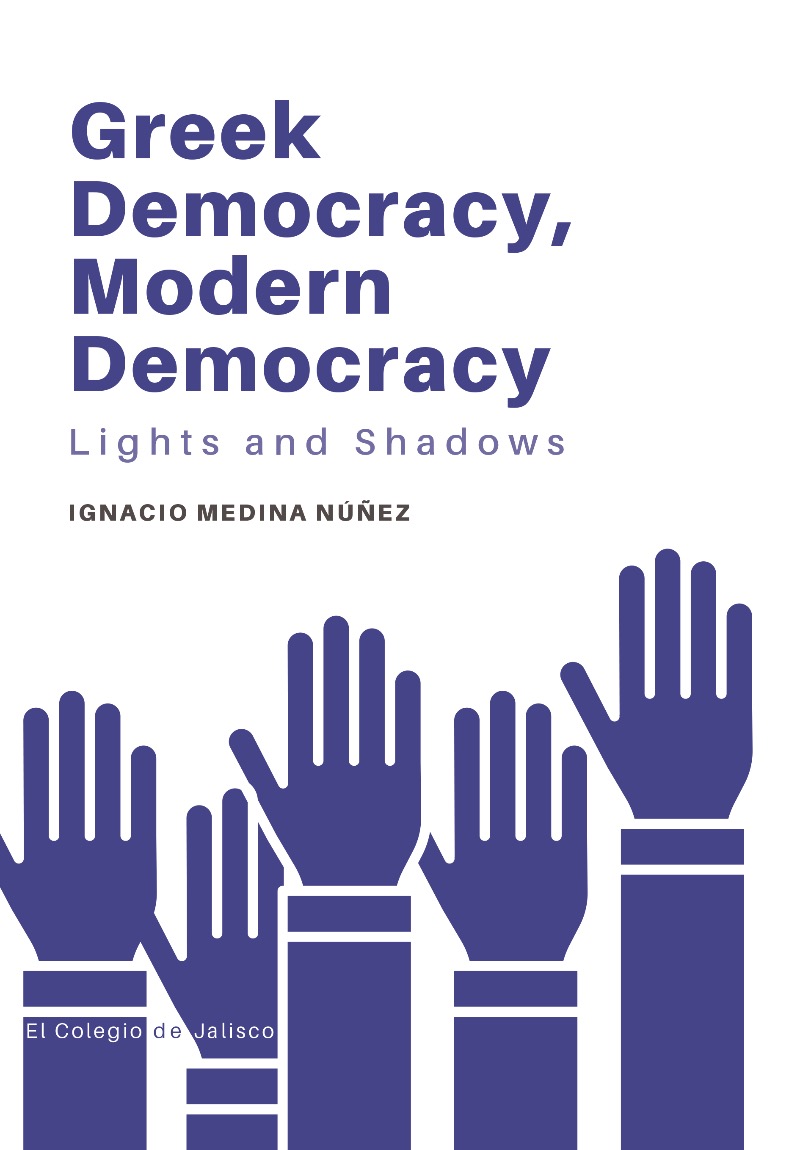
Greek Democracy, Modern Democracy
Lights and Shadows
Colaboradores:
Medina Núñez, Ignacio (Traductor)
Zamudio, Valencia (Prologuista)
Editorial:El Colegio de Jalisco
Materia:Democracias modernas
Público objetivo:Profesional / académico
Publicado:2025-09-29
Número de edición:1
Tamaño:1.4Mb
Soporte:Digital
Formato:PDF
Idioma:Inglés
Libros relacionados
La democracia en México - González Casanova, Pablo
Los Avatares de la Democracia - Bokser Liwerant, Judit
Autoritarismos y democracias en el sistema internacional contemporáneo - Pérez Rodríguez, Beatriz Nadia; Tzili Apango, Eduardo; Gutiérrez del Cid, Ana Teresa; Tadeo Hernández, Eduardo Luciano; Catalán Salgado, Enrique; Ramírez Tapia, Walfred Daniel; Vidal de la Rosa, Godofredo; Sayeg Salgado, José Anuar; Vega Torres, Jathalia; Novelo y Urdanivia, Federico Jesús; Ortega Reyna, Jaime; Sosa Bonilla, Mary Carolina; Juárez Salazar, Edgar Miguel; Robles García, Christian Ricardo; Marcuzzi, Rosa María; Tzeiman, Andrés; Henao Castrillón, Kelly Johana; Vázquez García, Agustín Raymundo; Valencia Escamilla, Laura; Martínez Cruz, Jessica; Rodríguez Pérez, Adán Miguel; Martínez Serrano, Alejandro; Nava Ramos, Misael Arturo; Estévez Daniel, Mauricio Alonso; Trujillo Juárez, Ana Luisa; Serrano Caballero, Enriqueta; Guel Marentes, Arturo Salvador; Ochman Ikanowicz, Marta Bárbara
Autoritarismos y democracias en el sistema internacional contemporáneo - Pérez Rodríguez, Beatriz Nadia; Tzili Apango, Eduardo; Gutiérrez del Cid, Ana Teresa; Tadeo Hernández, Eduardo Luciano; Catalán Salgado, Enrique; Ramírez Tapia, Walfred Daniel; Vidal de la Rosa, Godofredo; Sayeg Salgado, José Anuar; Vega Torres, Jathalia; Novelo y Urdanivia, Federico Jesús; Ortega Reyna, Jaime; Sosa Bonilla, Mary Carolina; Juárez Salazar, Edgar Miguel; Robles García, Christian Ricardo; Marcuzzi, Rosa María; Tzeiman, Andrés; Henao Castrillón, Kelly Johana; Vázquez García, Agustín Raymundo; Valencia Escamilla, Laura; Martínez Cruz, Jessica; Rodríguez Pérez, Adán Miguel; Martínez Serrano, Alejandro; Nava Ramos, Misael Arturo; Estévez Daniel, Mauricio Alonso; Trujillo Juárez, Ana Luisa; Serrano Caballero, Enriqueta; Guel Marentes, Arturo Salvador; Ochman Ikanowicz, Marta Bárbara
Reseña
The author has carried out a historical-sociological study to compare features of democracy in ancient Greece with the resurgence of the model in the modern era of the seventeenth century, beginning with the thought of Baruch Spinoza. Although these were very different periods and contexts in which concepts may hold distinct meanings, it is worth recalling what Benjamin Constant once affirmed: “Athens was the one which most resembles the modern ones”.
Both in Antiquity and in Modern times, the democratic model has had its great successes and failures, its lights and shadows. While it remains a preferable system compared to the dictatorship of an individual or the oligarchies of powerful groups, it can also become a model where freedom is suppressed and the interests of a few prevail over those of the majority.
Here, a fundamental feature is highlighted: the freedom of every individual to think and to express themselves. The struggle is carried over into the ideological and political arena, where many groups seek to impose a post-truth outlook on the population’s mind as a distortion of reality.
Finally, the work revisits the proposal of deliberative democracy.




